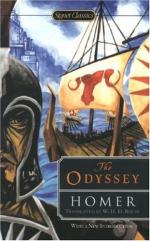Ulysses answered, “Eumaeus, I have heard the story of your misfortunes with the most lively interest and pity, but Jove has given you good as well as evil, for in spite of everything you have a good master, who sees that you always have enough to eat and drink; and you lead a good life, whereas I am still going about begging my way from city to city.”
Thus did they converse, and they had only a very little time left for sleep, for it was soon daybreak. In the mean time Telemachus and his crew were nearing land, so they loosed the sails, took down the mast, and rowed the ship into the harbour. {136} They cast out their mooring stones and made fast the hawsers; they then got out upon the sea shore, mixed their wine, and got dinner ready. As soon as they had had enough to eat and drink Telemachus said, “Take the ship on to the town, but leave me here, for I want to look after the herdsmen on one of my farms. In the evening, when I have seen all I want, I will come down to the city, and to-morrow morning in return for your trouble I will give you all a good dinner with meat and wine.” {137}
Then Theoclymenus said, ’And what, my dear young friend, is to become of me? To whose house, among all your chief men, am I to repair? or shall I go straight to your own house and to your mother?”
“At any other time,” replied Telemachus, “I should have bidden you go to my own house, for you would find no want of hospitality; at the present moment, however, you would not be comfortable there, for I shall be away, and my mother will not see you; she does not often show herself even to the suitors, but sits at her loom weaving in an upper chamber, out of their way; but I can tell you a man whose house you can go to—I mean Eurymachus the son of Polybus, who is held in the highest estimation by every one in Ithaca. He is much the best man and the most persistent wooer, of all those who are paying court to my mother and trying to take Ulysses’ place. Jove, however, in heaven alone knows whether or no they will come to a bad end before the marriage takes place.”
As he was speaking a bird flew by upon his right hand—a hawk, Apollo’s messenger. It held a dove in its talons, and the feathers, as it tore them off, {138} fell to the ground midway between Telemachus and the ship. On this Theoclymenus called him apart and caught him by the hand. “Telemachus,” said he, “that bird did not fly on your right hand without having been sent there by some god. As soon as I saw it I knew it was an omen; it means that you will remain powerful and that there will be no house in Ithaca more royal than your own.”




